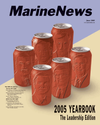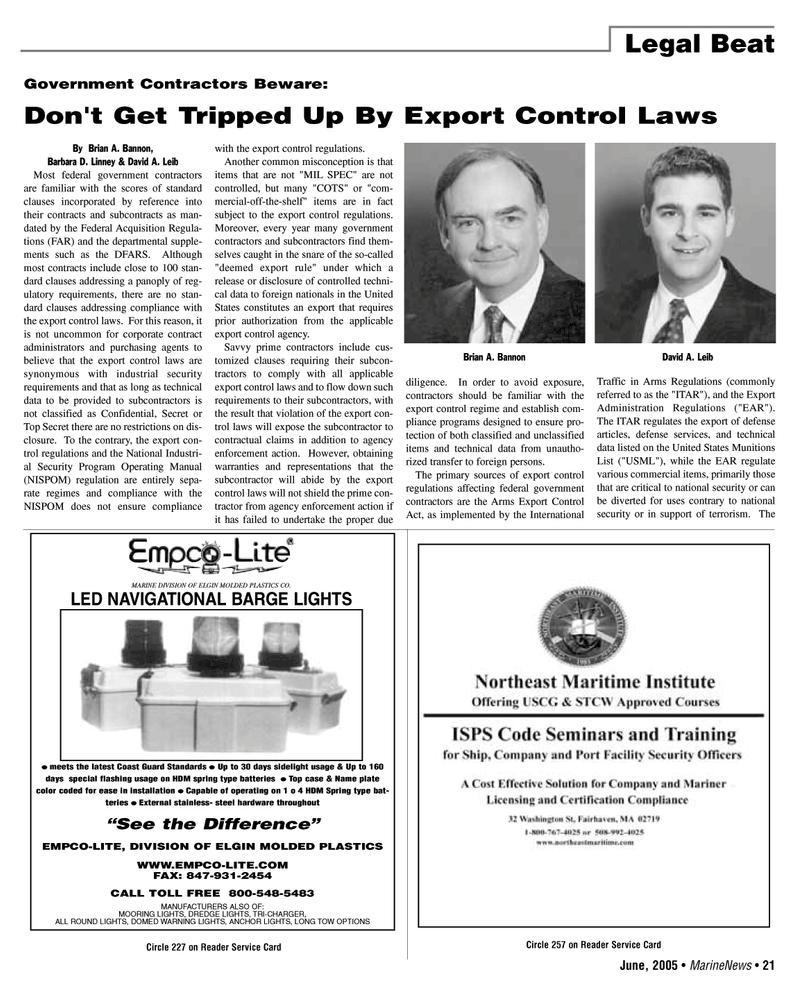
Page 21: of Marine News Magazine (June 2005)
Read this page in Pdf, Flash or Html5 edition of June 2005 Marine News Magazine
June, 2005 • MarineNews 21
Circle 257 on Reader Service Card
Circle 227 on Reader Service Card ? meets the latest Coast Guard Standards ? Up to 30 days sidelight usage & Up to 160 days special flashing usage on HDM spring type batteries ? Top case & Name plate color coded for ease in installation ? Capable of operating on 1 o 4 HDM Spring type bat- teries ? External stainless- steel hardware throughout “See the Difference”
EMPCO-LITE, DIVISION OF ELGIN MOLDED PLASTICS
WWW.EMPCO-LITE.COM
FAX: 847-931-2454
CALL TOLL FREE 800-548-5483
MANUFACTURERS ALSO OF:
MOORING LIGHTS, DREDGE LIGHTS, TRI-CHARGER,
ALL ROUND LIGHTS, DOMED WARNING LIGHTS, ANCHOR LIGHTS, LONG TOW OPTIONS
MARINE DIVISION OF ELGIN MOLDED PLASTICS CO.
LED NAVIGATIONAL BARGE LIGHTS
By Brian A. Bannon,
Barbara D. Linney & David A. Leib
Most federal government contractors are familiar with the scores of standard clauses incorporated by reference into their contracts and subcontracts as man- dated by the Federal Acquisition Regula- tions (FAR) and the departmental supple- ments such as the DFARS. Although most contracts include close to 100 stan- dard clauses addressing a panoply of reg- ulatory requirements, there are no stan- dard clauses addressing compliance with the export control laws. For this reason, it is not uncommon for corporate contract administrators and purchasing agents to believe that the export control laws are synonymous with industrial security requirements and that as long as technical data to be provided to subcontractors is not classified as Confidential, Secret or
Top Secret there are no restrictions on dis- closure. To the contrary, the export con- trol regulations and the National Industri- al Security Program Operating Manual (NISPOM) regulation are entirely sepa- rate regimes and compliance with the
NISPOM does not ensure compliance with the export control regulations.
Another common misconception is that items that are not "MIL SPEC" are not controlled, but many "COTS" or "com- mercial-off-the-shelf" items are in fact subject to the export control regulations.
Moreover, every year many government contractors and subcontractors find them- selves caught in the snare of the so-called "deemed export rule" under which a release or disclosure of controlled techni- cal data to foreign nationals in the United
States constitutes an export that requires prior authorization from the applicable export control agency.
Savvy prime contractors include cus- tomized clauses requiring their subcon- tractors to comply with all applicable export control laws and to flow down such requirements to their subcontractors, with the result that violation of the export con- trol laws will expose the subcontractor to contractual claims in addition to agency enforcement action. However, obtaining warranties and representations that the subcontractor will abide by the export control laws will not shield the prime con- tractor from agency enforcement action if it has failed to undertake the proper due diligence. In order to avoid exposure, contractors should be familiar with the export control regime and establish com- pliance programs designed to ensure pro- tection of both classified and unclassified items and technical data from unautho- rized transfer to foreign persons.
The primary sources of export control regulations affecting federal government contractors are the Arms Export Control
Act, as implemented by the International
Traffic in Arms Regulations (commonly referred to as the "ITAR"), and the Export
Administration Regulations ("EAR").
The ITAR regulates the export of defense articles, defense services, and technical data listed on the United States Munitions
List ("USML"), while the EAR regulate various commercial items, primarily those that are critical to national security or can be diverted for uses contrary to national security or in support of terrorism. The
Legal Beat
Government Contractors Beware:
Don't Get Tripped Up By Export Control Laws
Brian A. Bannon David A. Leib
JUNEMN2005 3(17-24)saved3.qxd 5/26/2005 12:34 PM Page 21

 20
20

 22
22
